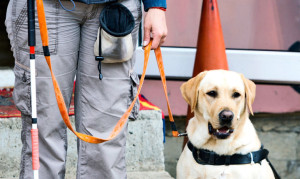
In the UK, it costs about £35,000 to train a guide dog to the standard required to aid a visually impaired person to travel outside of their home. But more than 100 dogs are retired each year due to behavior problems.
Why do so many partnerships break down? New research suggests the dog isn’t solely to blame.
At first it may appear to be the dog’s behavior that leads to problems, but guide dog partnerships are more complex than that and a range of factors can make or break this unique relationship.
Compatibility plays a big part in the success of a guide dog partnership. A working guide dog partnership requires a blend of cooperation, communication, and trust. Therefore there are many considerations to take into account when matching people with guide dogs. If that relationship fails, aside from the financial implications of early retirement, there are welfare concerns for guide dog owners who lose both the independence and companionship acquired through a guide dog.
“Guide dog owners often form a strong bond with their guide dog,” says Chantelle Whelan, a third year PhD student at the School of Veterinary Medicine and Science at the University of Nottingham.
“This in turn causes a great deal of uncertainty when deciding to end the partnership if it is not working out. One guide dog owner who took part in the research said they still had a bond with their dog as a pet even though their working relationship was failing. If they could have kept their dog as a pet dog they would have done. He was very upset about losing his dog but agreed it was the best thing for both of them.”
Researchers looked at six guide dog partnerships that had broken down in the first three years of working together due to behavioral problems. To build an in-depth case study of each partnership researchers interviewed each guide dog owner, the volunteer that looked after the dog for the first year of its life (known as a puppy walker), and the person who had re-homed the dog as a pet after it was retired.
Along with these accounts, reports written by the guide dog trainer who oversaw the partnership were examined as well as data about the dog that is kept in the Guide Dogs database.
“Whilst it first appeared as though the behavior of the dog led to the retirement, the case studies revealed a more complicated story,” Whelan says. “In most cases it was a combination of the dog’s character with the guide dog owner’s circumstances, lifestyle, and previous experiences that contributed to the retirement.”
Groups that match potential guide dogs with people recognize the process can be improved. The new research provides evidence of the current issues faced and recommendations are being made on how to incorporate these into the matching process.
The findings shed light on the complexities involved in guide dog partnerships. While other dog-owner pairs my not share all of these, there are some elements that can be applied to others. A better understanding of human-dog relationships and the reasons why some are successful while others aren’t can be used to inform the matching of humans and dogs in other sorts of partnerships.
This could include other types of assistance dogs or re-homing dogs from animal shelters. Many dogs are given to animal shelters when people feel they cannot keep the dog as a pet for various reasons.
Source: University of Nottingham and Futurity.org








